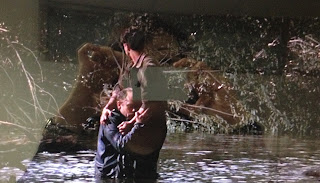Chapter 1 Quiz
Chapter 2 Quiz
Chapter 3 Quiz
Chapter 4 Quiz
Chapter 5 Quiz
Checklist
Sample Letter:
-->
Dear
George,
There
is a grievance I must share with you that has made me re-evaluate the world I
live in. I have arrived at this conclusion after having watched your friendship
with Lennie and I need to make it known that I do not believe your friendship
with Lennie to have been one that upholds true standards of friendship. I
believe that you wronged Lennie when you put a gun to his head. Call me a
fundamentalist, if you will, but hear me out first.
A
friend, no matter what, has the obligation of providing protecting whether by
protecting a friend’s integrity or protecting their physical well being. Thus,
I assign friendship to those who would not allow another to unjustly stain my
name or reputation as well as those who would not allow harm to come on me in
any circumstance. Anyone who allows for harm, as harm as an act of benevolence
would be difficult to define, is not a friend. Death causes harm. Insult causes
emotional harm. Extended and forcibly obtained isolation also causes harm. You,
George, I believe, was an agent of harm in George’s life, no matter the false veil
of protection that you provided him.
What
do I mean, you might ask. Let me elaborate. Although you brought Lennie with
you and helped him escape from Weed, one must consider how Lennie arrived in the
situation of being in company with a woman he did not know. Especially having
known his proclivity towards touching soft items roughly and with it being
acknowledged that he had only the mental capacity that of a child or less, why
was he left in such a situation? You wouldn’t leave a child with a weapon that
had the potential to harm him especially when the child leaned towards touching
this weapon. Why would you leave Lennie’s company unmanned and with a woman. As
a matter of fact, why would you do that twice? In the case of Lennie’s
encounter with Curly’s wife, you had already acknowledged that Lennie was
approached by her and that interacting with her could be dangerous. Although
you gave that warning to him, if it was so detrimental to achieving your dreams
of having a lifelong friendship with Lennie and own private residence together,
then why not prevent interaction with her at all costs? Why was he left to his
own devices in the barn that fateful day? One might think of your friendship,
as conversely a relationship of negligence. A child with lethal or dangerous
tendencies needed more attention than you gave and exemplifies weakness of your
friendship. Moreover, as stated previously, you isolated him from direct
interaction with others assigning yourself as his speaking piece. By
conditioning him to respond only to your commands, even to the point of not
fighting back with Curly even after he lay blow after blow on Lennie’s
defenseless figure, Lennie suffered the attack and then the anguish of having a
jarring, delayed reaction to a beating rather than an instinctual reaction to a
first attempt at attack. In his forced state of isolation brought down on him
by you, he also was robbed of the company of Crooks and moreover, was shown as
so very co-dependent on you that the thought of loosing you by some
serendipitous route, caused Lennie great distress.
Your
relationship with Lennie revealed to me many facets of friendship I did not
previously consider, especially the facets of friendship that earmark a
friendship that rests on a false façade. You, like the rest of the men on the
farm, did not know what true friendship upholds. As Candy’s dog lost it’s value
and therefore its life, so did Lennie and was sadly gunned down. The only favor
you did, a sentimental gesture, was that it was you who pulled the trigger and
not a stranger. Perhaps you should be commended in that, as it was a gentler
manner of death than that of what Candy would have inflicted. However,
inflicting death was still a irregular gesture of love, wouldn’t you say? There
were other options, George that you did not take. And like the men on the farm,
when you realized Lennie, in his helpless state of remaining on an
unintentional, yet destructive path, would not produce anything valuable for
you, you ended his life. You did not run away with him. You did not sacrifice yourself
for him, which is the ultimate gesture of love. You sacrificed him and
therefore, rendered yourself under the same weight of a companion-less, lonely
existence where there would be an absence of the thing that made you and the
other guys who go farm to farm different. By taking into your own hands the
life of a companion, you have suggested that friendship also include death. And
like I said before, call me a fundamentalist, but to such a belief I cannot
subscribe. Perhaps when Candy meant that when he was rendered useless, others
would not do him the favor of killing him, if you were able to demonstrate the
true nature of friendship, you might have rebutted that the central misguided
thought that plagued Candy and ultimately brought you to the kill your friend
was this: Friendship and utility are disjoint concepts and when a person
is rendered useless, a person with a true friend would be able to rest in the notion that
their friendship was not threatened.
A
concerned citizen,
Mrs.
Lee
P.S. How's the cat house been treating you on yours and Lennie's combined wages?




 Best Blogger Tips
Best Blogger Tips